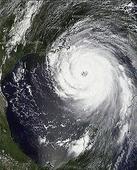
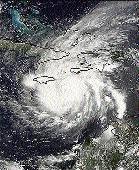
Left: NASA satellite image of Hurricane Katrina. Right: Hurricane Ivan, before reaching Jamaica.Vallana Hill, Contributor
Global warming is officially the human race's most viable predator. Funny that a species intelligent enough to calculate the origin of the universe, and able to explore beyond the realm of this galaxy, has inadvertently set in motion a series of events which has the potential to construe its own demise at an alarming rate. The effects of radical climate change attributed to the rising of the earth's temperatures, which has just begun to affect us, range from massive flooding, to extreme droughts, stronger and more frequent cyclones and hurricanes, as well as a gradual but steady rise in the ocean level.
In 2005, the North Atlantic region experienced a record number 27 storms, 15 of which werehurricanes. In that same year, some of the strongest hurricanes in recent history were seen, such as Hurricane Katrina - which reached maximum winds of 150mph and Hurricane Rita [1], also with the same wind speed; both devastating the southern states bordering the Gulf of Mexico. The previous year Hurricane Ivan grazed the island of Jamaica, causing millions of dollars in damage before going on to completely ravage the Cayman Islands.
Not only are the immediate effects of climate change catastrophic but in the long term, the outlook is even bleaker. If all glaciers and ice caps melt, the projected rise in sea level will be around 0.5 m. Melting of the Greenland ice sheet would produce 7.2 m of sea level rise, and melting of the Antarctic ice sheet would produce 61.1 m of sea level rise. The collapse of the grounded interior reservoir of the West Antarctic ice sheet would raise sea level by 5-6 m [2] - combined that is over 70 meters in the rise of the sea level.
Coastline submerged
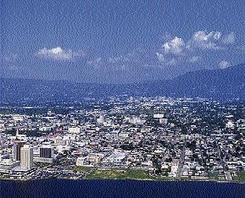
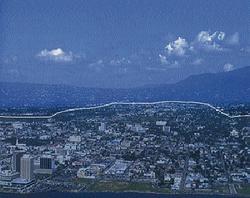
Left: Three-dimensional view of Kingston. Right: Three-dimensional picture of Kingston under water, after a sea level rise of 70 metres.
To put that figure into perspective, all of Jamaica's coastline would have been submerged, wiping out Kingston, Montego Bay, Portland, Ocho Rios, Negril to name a few; all gone within the next few hundred years.
A study in the April 2007 issue of Environment and Urbanisation reports that 634 million people live in coastal areas within 30 feet of sea level globally. The study also reported that about two thirds of the world's cities with over five million people are located in these low-lying coastal areas. Entire cities, countries and populations could be displaced due this problem. The world is looking to the largest nations to find a solution to this ever-increasing problem, however, the largest contributor of greenhouse gases to theatmosphere is the United States, which for a long time refused to sign the Kyoto Protocol - an international treaty on the reduction of greenhouse gas emissions from the world's largest industrialised nations. China, which is close behind and is expected to surpass the U.S. by the year 2008, is considered a developing country and as such is not required to reduce their emission levels. So where does that leave our island? What can we do?
Every human being on planet earth has what is called a footprint. This term is used to quantify the amount on non-renewable energy each person uses on average - the lower the footprint the nicer you are to the environment it may seem small compared to the large companies spewing out toxic gases daily or the ever so often burning of the Riverton Dump, we all can contribute to the betterment of the environment by making some small changes. Some conservation tips: use less air conditioning while driving; be sure to service your automobile regularly for maximum efficiency; turn off and plug out all electrical appliances at the end of the day, and most importantly, use only what you need, when you need it.
Addressed by all the political parties
With the upcoming decision-making process of a possible new government, it should be essential that this topic is addressed by all the political parties who are seeking our vote. Laws should be implemented for waste disposal and gas emissions, forcing companies to be responsible for their contribution to this global dilemma. The world is ever changing, but it's the only one known for our survival. We need to keep it that way.
The MIAS is a non-profit organisation of the University of the West Indies, Pure & Applied Sciences Department, offering analytical, technical and web services and specialised science projects. If you have any question or comments about these articles please email : mias@uwimona.edu.jm or contact the MIAS Analytical Services Division at 970-2042 or 512-3067 for enquires onservices offered.
References:National Geographic: Warming to Cause Catastrophic Rise in Sea Level?[1] NOAA Satellite & Information Service[2] http://en.wikipedia.org/wiki/Sea_level_rise
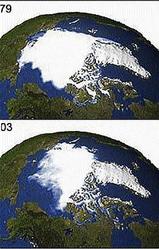
This picture shows the difference in polar ice cap density over the last quarter century.
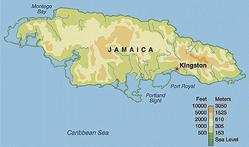
All the low-level areas and coastal lines will be submerged under water.

